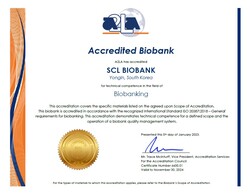Biobank, a bank of human body derivatives under Seoul Clinical Laboratories (SCL), has won the “ISO 20387:2018” international certification from the American Association for Laboratory Accreditation (A2LA) as the first such Asian organization.
A2LA is the world’s largest certification body recognized by the International Laboratory Accreditation Cooperation (ILAC). In addition, it is the only independent non-profit international organization that provides a comprehensive conformity assessment in the United States.
ISO 20387:2018 is an international standard specifying requirements for eligibility, fairness, and consistent operation for biobanks. A2LA is the most authoritative certification authority in the biobank field.
Starting with the Biobank at Cornell University in May 2019, seven organizations have received the A2LA certification. However, SCL’s Biobank is the only one in Asia.

A2LA evaluates the biobank’s operational capabilities, human body resources for research and development, and related data provision to certify an organization. In addition, it assesses the biobank’s collection, preservation, storage, distribution, transportation, and disposal of documents and on the site.
To win recognition for the objective excellence of its operation system, SCL also underwent two years’ preparations, including making an English-language standard operational procedure (SOP), received an assessment in the document and on the site last October, and won the certification on Jan. 5.
The certification means that the entire process of the Biobank is transparent, and it carries out high-quality work under strict standards. It also means that the SCL Biobank has won international recognition for its capabilities, service quality, and reliability.
“SCL Biobank has obtained international recognition for its excellent resources and credibility,” SCL Chairperson Lee Kwan-soo said. “We will continue to contribute to conducting joint researchers and upgrading the results of such research with Korean and foreign organizations through stable biobanking service.”
SCL, which meets its 40th founding anniversary this year, received the permit for biobanking service from the Ministry of Food and Drug Safety in 2016 for the first time in Korea and has since strived to enhance the convenience of Korean researchers.
It has played an especially pivotal role in collaborative research with external institutions (researchers) who have difficulty securing research samples.

